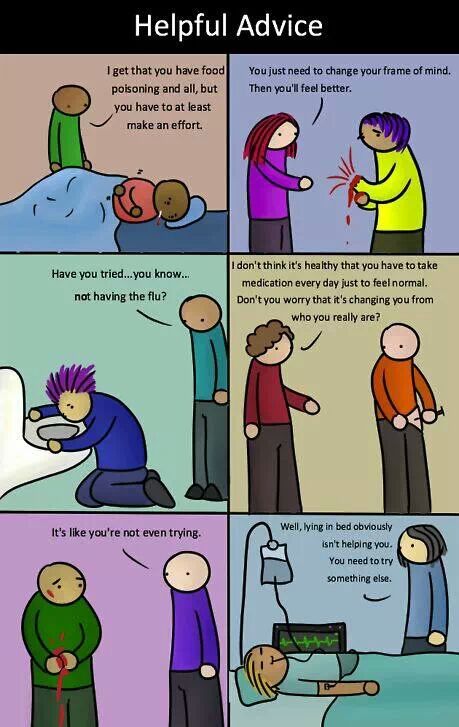
This post is written in response to day 3 of the Daily Post Zero to Hero tasks.
I’ve seen this image going around Facebook a lot lately and it has got me thinking.
Since my crash in April last year, I have become aware of this large community that I didn’t even know existed before. The Spoonie Community is one that I’m finding myself relating to, and becoming involved with, more and more as I increase my attempts at raising awareness and understanding how chronic illnesses affect our lives. Although my obvious focus is on Myalgic Encephalomyelitis, Fibromyalgia and Pelvic Congestion Syndrome, I am recognising the similarities between the symptoms and issues I face with these illnesses and those faced by others in the Spoonie Community.
A big issue is the fact that awareness levels about chronic illnesses in the general public, especially illnesses with invisible symptoms, is low almost to the point of being non-existant. I don’t remember ever talking about chronic illnesses in school when we learnt about health related topics. There was information on acute and life threatening illnesses such as cancer, and some information on mental health and topics like depression, but nothing on chronic pain, brain fog and fatigue. This lack of information and awareness leads to a lot of negative responses to people who suffer from these illnesses, with comments like those in the image above that demonstrate a lack of awareness and belief in the reality of the symptoms these people are facing.
Some of the illnesses, such as Myalgic Encephalomyelitis, isn’t even widely recognised or accepted as an actual physiological condition in the medical community. People suffering with these conditions often have to face not just the constant and often extreme symptoms caused by their conditions, but the disbelief and lack of sympathy from those around them. Many are even treated like it is all in their head and told that the issue is psychological.
I believe that it is important that awareness of these illnesses be raised in both the general and medical communities. This awareness raising should begin in schools at a young age to increase acceptance and understanding in the community.
Today I am taking the day to focus on my personal visions of what a successful 2014 would look like for me. On top of the obvious answers such as increased or stablised health, returning to work in some capacity, and enjoying time with my family and friends, I believe there will also be a section in there on increasing public awareness of invisible illnesses to help increase acceptance and understanding. I already have some ideas on how I can do this and I will share them with you over the next few months.
To succeed in changing public perception I believe we all need to work together. There are already projects out there that are focusing on increasing awareness around particular topics, such asthe Canary in a Coal Mine film focusing on raising awareness of Myalgic Encephalomyelitis, that focus on engaging adults but from what I have seen so far there is still a gap in education that would be suitable for all invisible illnesses and all ages.


I suffer from chronic pain, pins and needles in my legs, brain fog, fatigue, etc etc and that little cartoon and your post hit home a lot! Not being able to point to a visible condition (or in my case, even be able to give a name) is difficult for people to understand. I cannot count how many times I’ve been told “Just stop thinking about it and it’ll go away” or “It’s all in your mind… mind over matter”. Thanks for posting 🙂
You’re welcome 🙂 You may be interested in my upcoming project. Keep reading over the next few months and let me know what you think when I put it up 🙂
And, I’ll definitely be checking back!
Thanks 😀
I’ve also not been officially given a name for half my symptoms, just several doctors who’ve said it may be fibromyalgia. So I understand the difficulty of explaining when you don’t have a name for it. Have you found a good doctor that listens to you?
Not really… I thought I had but just moved to a new city today and my visit with her yesterday was less than helpful. I’ll be looking for a new one here soon… just have to wait for insurance stuff.
I think I’ve found a good GP but I’m still struggling to find a specialist. I’m also struggling with insurance claims at the moment.
Geesh, i’m aging out of my mom’s plan in like 2 weeks so I’m not even looking for a GP or specialist until after the new one kicks in. It’s harder to find a GOOD doctor that cares and listens without assuming if he/she can’t see it that you’re making it up.
Cannot wait to see what you are working on!
I know what you mean!
I have all the symptoms you just listed. It is not in your head and you need to see an arthritis specialist. Mine diagnosed my fibromyalgia. It won’t go away , it is not in your head and there are things they can do to help you deal with this dibilitating disease.I hope you find help.
Thanks Debbie, I have been diagnosed with Fibromyalgia and ME/CFS. It’s definitely something that’s real. The problem is more in getting others to understand than in believing it yourself.
Boy that’s the truth. I wrote a post called “You Don’t Look Sick” !!!I explain it for family members and friends. It really helped my family understand . (momentarily) They forget it isn’t going to get better!! They ask every day. You feeling better today? Which tells me they’ve forgotten that they understood it yesterday!! 😦
I don’t know if you are interested… but I have an extensive board on Pinterest on fibromyalgia. Debbie Hayes Johnson
I’ve never considered fibromyalgia but it’s been coming up more and more in my searches. I am going to add that to my list and have that checked out. Thank you so much for bringing that up! I hope you find relief, as well!
You’re welcome, I hope you find some support and relief soon.
Thank you so very much . “You don’t Look Sick” Read more at debbiesjourneytohelathandhope.com
I agree with you Megan, lots more needs to be done to change the public’s perception of ‘invisible’ chronic illnesses. Here in the UK we are sadly seeing a hardening of attitudes against all types of disability at present. I’ve known a number of ME sufferers over the years and seen how debilitating it can be.
Thank you for your support of this topic. Do you suffer from anything yourself?
Hi Megan, I am fortunate and rarely suffer from ill-health myself. Another thought I did have regarding your education aim … I don’t know if you are in touch with support groups near to you or if you maybe collecting info about support groups to add to your blog. In our area (north east England) the charity ME North East provides good support to both adults and young people and they are pretty active in providing support services as far as they can. As well as supporting people who suffer from ME/CFS and Fibromyalgia, I know they used to do talks and have information to help explain these chronic conditions to non-sufferers eg for use in schools.
That’s a great idea! I have just joined my local society, but I’ll look into creating a list for the site. I might give a call out to others to let me know of any in their area or that they know of elsewhere. Thank you for your input. Please keep reading my posts as I’m currently planning the first step of the education process and would love your input!
Hi Megan – you are welcome for my ramblings – hope they are useful!
Megan, I see there is a long list of UK support groups (organised by county) on the ME Association’s website … which I guess they wouldn’t be keen for you to just copy 😉
… but what I did feel about their list is that whilst it does give useful contact details for the various support groups, it doesn’t have that ‘personal’ connection to the groups. I wonder if people who are members of support groups might add their feedback/comments about their own groups for your list ??? … just an idea
p.s. I am following your blog now so I can keep in touch with how you’re getting on 🙂
Thanks, great ideas! I’ll see what I can do 🙂
HA! I meant to add the ME North East website link to my post! This is it:
http://www.menortheast.org/
Thanks, I’ll add it to the list I’m now creating 😉
Imade a mistake above the link was to debbiesourneytohealthandhope.com sorry
still wrong… I’m so sorry… debbiesjourneytohealthandhope.com